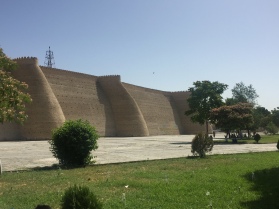 On Sunday morning we were all fresh after a pleasant air conditioning night rest and ready to meet our tour guide for the journey. A lovely compact Uzbek lady dressed in turquoise and yellow colours with an amazing knowledge of the city of Bukhara and hunger for explaining us every single detail was waiting for us in the reception of the hotel. The first stop was just right opposite our accommodation. An ancient castle/fort looking structure with an impressive fortified stone wall. Inside, the ruins of a city along with natural science museums gave us an idea of the kind of lifestyle and species that had previous occupied that particular area. After bar
On Sunday morning we were all fresh after a pleasant air conditioning night rest and ready to meet our tour guide for the journey. A lovely compact Uzbek lady dressed in turquoise and yellow colours with an amazing knowledge of the city of Bukhara and hunger for explaining us every single detail was waiting for us in the reception of the hotel. The first stop was just right opposite our accommodation. An ancient castle/fort looking structure with an impressive fortified stone wall. Inside, the ruins of a city along with natural science museums gave us an idea of the kind of lifestyle and species that had previous occupied that particular area. After bar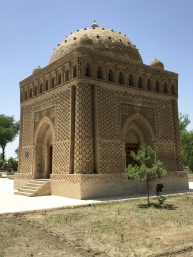 gaining in one of the local shops for some souvenirs, we had a quick stop for a refreshing coke, just before heading to a little cosy mosque where a local artist was doing some painting and hand crafting job on the interior walls of the sacred building. A walk in the park allowed us to see one of the most ancient buildings in Bukhara which had been kept until our current days in a perfect state. A small squared construction, similar to a mosque with great amount of detail. For lunch we had the chance to visit a local Uzbek restaurant where aside of having a delicious meal we could also enjoyed live performances of Uzbek traditional dance; along with some cool moves from our students and professors.
gaining in one of the local shops for some souvenirs, we had a quick stop for a refreshing coke, just before heading to a little cosy mosque where a local artist was doing some painting and hand crafting job on the interior walls of the sacred building. A walk in the park allowed us to see one of the most ancient buildings in Bukhara which had been kept until our current days in a perfect state. A small squared construction, similar to a mosque with great amount of detail. For lunch we had the chance to visit a local Uzbek restaurant where aside of having a delicious meal we could also enjoyed live performances of Uzbek traditional dance; along with some cool moves from our students and professors.
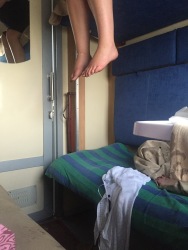 The journey back to Tashkent was… to describe it somehow, challenging. Since the minute we stepped inside, sweat was a constant fluid in the body, not even the breeze produced by the movement of the train could help us to cool down. However I loved the fact that we shared train dorms, it reminded me to the Hogwarts express, I wish I could have had a spell to stop the heat. I did not sleep much that night, however I did play plenty of card games and I got to know better my colleagues from Westminster and Tashkent. It is interesting how easily you forget about adverse conditions when you are with people that make you feel good.
The journey back to Tashkent was… to describe it somehow, challenging. Since the minute we stepped inside, sweat was a constant fluid in the body, not even the breeze produced by the movement of the train could help us to cool down. However I loved the fact that we shared train dorms, it reminded me to the Hogwarts express, I wish I could have had a spell to stop the heat. I did not sleep much that night, however I did play plenty of card games and I got to know better my colleagues from Westminster and Tashkent. It is interesting how easily you forget about adverse conditions when you are with people that make you feel good.


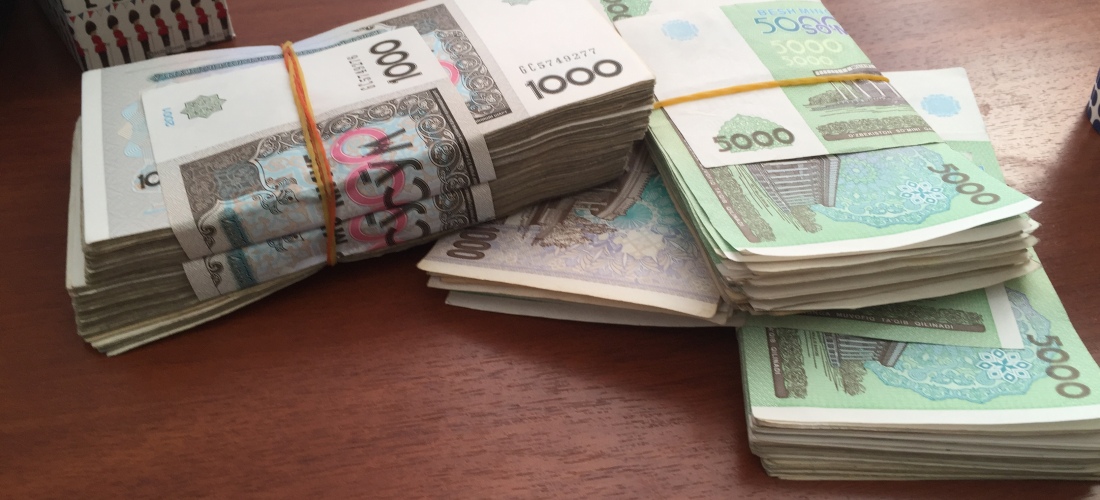
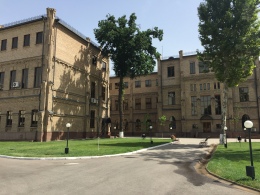
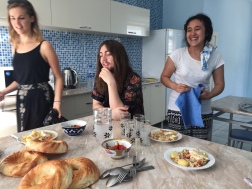 ooked for us from an Uzbek student without knowing us, that is really a treasure.
ooked for us from an Uzbek student without knowing us, that is really a treasure.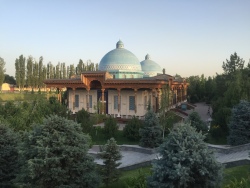 different point of view to the ongoing process of globalization, as no one better than Uzbek students who have previously read about the topic could have gave us a better insight in to their views. It is the perfect chance to challenge ourselves and our ideas about international relations, sharing our views and opinions and being able to contrast it with the students of the Westminster International University of Tashkent. The reason for visiting a new country is definitely about discovering different ways of architecture and taking digital memories of beautiful landscapes, but it should also be about discovering the local culture and interacting with its citizens.
different point of view to the ongoing process of globalization, as no one better than Uzbek students who have previously read about the topic could have gave us a better insight in to their views. It is the perfect chance to challenge ourselves and our ideas about international relations, sharing our views and opinions and being able to contrast it with the students of the Westminster International University of Tashkent. The reason for visiting a new country is definitely about discovering different ways of architecture and taking digital memories of beautiful landscapes, but it should also be about discovering the local culture and interacting with its citizens.
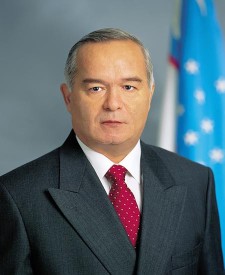 With a population of approximately 31 million people, Uzbekistan is a lower middle income country in comparison with its neighboring countries. It is the fourth largest gold deposit in the world, activity that is complemented with the trade of copper, uranium and cotton. Islam Karimov has been the only president in the country since 1991 when Uzbekistan gained independence from the Soviet Union. Zeromax is one of the biggest group of companies registered in Switzerland trading with raw materials from Uzbekistan, along with other activities such as transport, agriculture and the official football club. Zeromax is led by Gulnara Karimova, daughter of Karimov who is also a fashion designer, singer and international socialite. Gulnara is an ambassador of Uzbekistan in the United Nations in Switzerland and ambassador of Uzbekistan in Madrid (Spain). Despite of being a democratic constitutional republic, many human rights international organisations such as the International Crisis Group and the United Nations, have raised concerns regarding violation of human rights in the region. One example of it is the children forced labor in the collection of cotton plantations or the attack from government military forces to a group of civilians in a pacific strike in the city of Andijan in 2005 leaving hundreds of men, women and children casualties (El pais, 2007).
With a population of approximately 31 million people, Uzbekistan is a lower middle income country in comparison with its neighboring countries. It is the fourth largest gold deposit in the world, activity that is complemented with the trade of copper, uranium and cotton. Islam Karimov has been the only president in the country since 1991 when Uzbekistan gained independence from the Soviet Union. Zeromax is one of the biggest group of companies registered in Switzerland trading with raw materials from Uzbekistan, along with other activities such as transport, agriculture and the official football club. Zeromax is led by Gulnara Karimova, daughter of Karimov who is also a fashion designer, singer and international socialite. Gulnara is an ambassador of Uzbekistan in the United Nations in Switzerland and ambassador of Uzbekistan in Madrid (Spain). Despite of being a democratic constitutional republic, many human rights international organisations such as the International Crisis Group and the United Nations, have raised concerns regarding violation of human rights in the region. One example of it is the children forced labor in the collection of cotton plantations or the attack from government military forces to a group of civilians in a pacific strike in the city of Andijan in 2005 leaving hundreds of men, women and children casualties (El pais, 2007).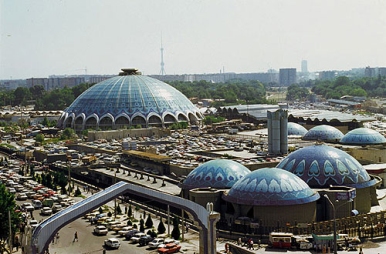 The purpose of the visit to Uzbekistan is reinforcing the links between the students of the university of Westminster in London and the students at the university in Tashkent, along understanding in a better way globalization, global interconnections and how this applies to the case of Uzbekistan as a country that is undergoing a process of economic, social and cultural change. The visit also allows us as students of Politics and International Relations to attend and learn from a number of academics and professionals in areas related to foreign affairs, economics and policy making.
The purpose of the visit to Uzbekistan is reinforcing the links between the students of the university of Westminster in London and the students at the university in Tashkent, along understanding in a better way globalization, global interconnections and how this applies to the case of Uzbekistan as a country that is undergoing a process of economic, social and cultural change. The visit also allows us as students of Politics and International Relations to attend and learn from a number of academics and professionals in areas related to foreign affairs, economics and policy making.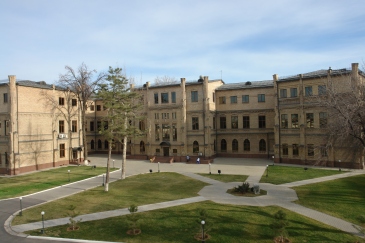 What it is attractive to me aside the academic perspective is the opportunity to travel to a country which is in the heart of many political issues occurring nowadays. Having the possibility to discover and understand their culture and how society is organised, along with enjoying their food and history is something that really excites me. Being able to attend the international university of Westminster in Tashkent is also a great opportunity to meet international students and share different opinions and points of view regarding issues that affect us all as member of a globalized world community, along with having the chance of learning from academics and professionals such as Dr Kamiljon Karimov and Alan P. France. Sharing workshops and masterclasses with Uzbek students and professors will contribute to widening my opinion and knowledge in regards to the economy, politics and culture of the country along with diversify my opinion in relations to international politics and globalization.
What it is attractive to me aside the academic perspective is the opportunity to travel to a country which is in the heart of many political issues occurring nowadays. Having the possibility to discover and understand their culture and how society is organised, along with enjoying their food and history is something that really excites me. Being able to attend the international university of Westminster in Tashkent is also a great opportunity to meet international students and share different opinions and points of view regarding issues that affect us all as member of a globalized world community, along with having the chance of learning from academics and professionals such as Dr Kamiljon Karimov and Alan P. France. Sharing workshops and masterclasses with Uzbek students and professors will contribute to widening my opinion and knowledge in regards to the economy, politics and culture of the country along with diversify my opinion in relations to international politics and globalization.